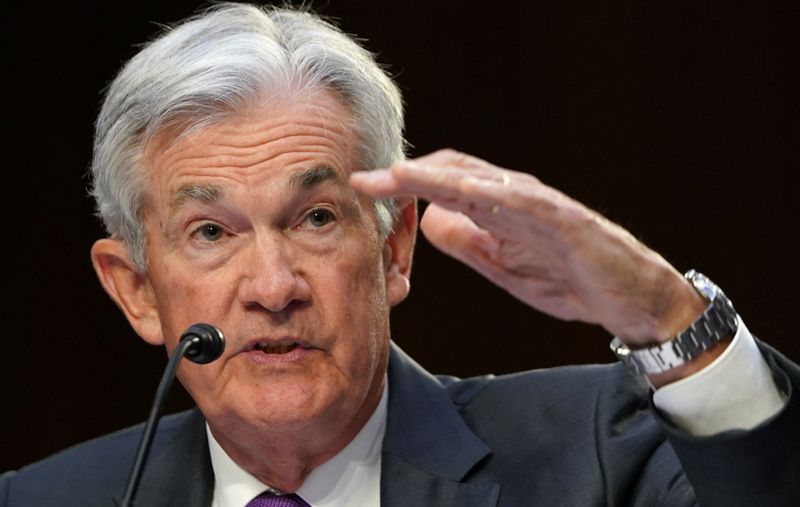By Michael S. Derby
(Reuters) - Federal Reserve Chair Jerome Powell said on Tuesday the U.S. central bank's decade-old 2% inflation target has in years past been a key factor in keeping inflation low and holding that target at the current level should help in policymakers' efforts to lower high price pressures.
"We think it's really important that we do stick to a 2% inflation target and not consider changing it," Powell said in his semi-annual testimony to the U.S. Senate Banking Committee. The 2% inflation target "really anchors inflation" because "the modern belief is that people's expectations about inflation actually have a real effect on inflation. If you expect inflation to go up 5% then it will," he said.
The Fed needs that anchor right now.
The U.S. central bank has been hiking rates aggressively and shedding bonds it owns to counter the highest levels of U.S. inflation seen in decades. Disruptions tied to the coronavirus pandemic, coupled with very strong levels of demand in part driven by government stimulus, have worked together to drive up inflation after many years of price pressures falling persistently short of the Fed's 2% target, which was first adopted in 2012 after years of existing in a de facto status.
The Fed's efforts to temper inflation have taken the benchmark overnight interest rate from near-zero levels a year ago to the current 4.50%-4.75% range. Powell noted on Tuesday that the persistence of high inflation amid broader economic strength could cause the central bank to quicken the pace of future rate rises and go farther with them over time.
BALANCING ACT
As the Fed has acted on inflation, it has been dogged by fears that its rate increases will push the economy into recession and drive up unemployment by an intolerable amount. That's caused some critics to say that the Fed may want to shift its inflation target up from 2%, making it both easier to reach a desired level while minimizing risks to the broader economy.
Fed officials have repeatedly pushed back against the idea. They argue that doing so now would impair their credibility with markets and the broader public, who would in the future expect the central bank to change its inflation target based on the expediency of whatever challenges it was then facing.
Policymakers also believe allowing inflation over 2% would help embed high price pressures into the economy and make it that much harder to lower inflation in the future.
Other major central banks also target 2% inflation. Many have questioned why officials have gravitated to that number, rather than something like zero, which in theory is the level that most aligns with unchanged inflation pressures. New Zealand's central bank was the first to try a 2% target.
Central bankers have countered that 2% gives them a cushion: It's not so high as to amount to noticeable overall price gains, and it helps central banks avoid outright price declines, which most economists consider to be damaging to an economy's health.

"You might say, '0% inflation, stable prices, no inflation, well, that makes sense,'" New York Fed President John Williams said on Jan. 19. That said, "we know that if you try to push inflation too low" it runs the risk of pushing a central bank's target rate to zero as well, which makes it harder to conduct monetary policy, he said.
"The 2% goldilocks answer, if you will, is really about balancing price stability goals and maximum employment goals, taking into account all the factors that influence the interplay between the two," Williams said.